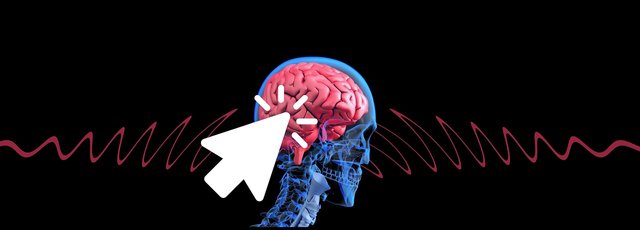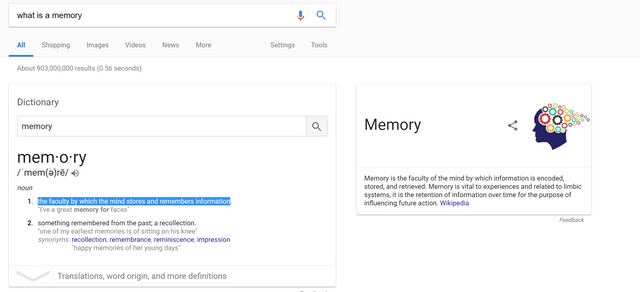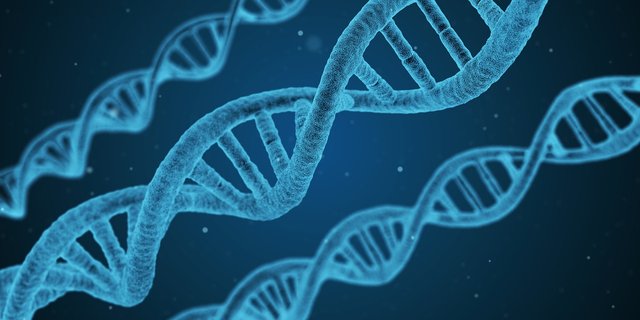What Really is a Memory? Bio-physical Representations of Memories, and Implanting Fake Memories on Command!

Ever since the early years of philosophy and psychology, people have pondered what memories actually are. We know that they involve information from our past, but there are a plethora of questions one might ask pertaining to how they are formed, stored, recalled, forgotten, and experienced. Before we take a dive into the relevant neuroscience regarding memories, we should first find stable grounds to explore this elusive concept. A quick google search for "what is a memory" yields these 2 definitions:

This first definition calls memory a faculty, implying that there is an inherent potential to do some kind of work. This is helpful for characterizing the memories are a sort of process but does not explain what allows for this capability, nor does is differentiate conscious (and explicit) experiences of previous states from your ability to reliably recognize the color red every time you see it. We would not often refer to this ability to identify simple features our memory, and there are many biological processes that can "remember" things we would never be aware of (such as an individual neurons ability to tell that it just fired an action potential).
This brings us to realize that we are not referring to all types of information storage when reference a memory, but more specifically the information that we consciously perceive. While we might "remember" that 4 time 5 is 20, there is likely no specific day, time, smell, or sound that this information tagged to. This is called semantic memory and is quite distinct from an autobiographical memory of a specific event. As time passes, we begin to forget the details of many of our experiences and instead extract the meaningful information about them. This is an efficient method of managing storage space, and does not leave us recalling each and every drive to work so that we can have an approximation of what it is like doing said activity. Then, if something truly out of the ordinary occurs, we can store that instance individually in greater detail. This is an important process and grants us wisdom and intuition in our later years. There are exponentially more distinctions to be made about different types of memory including that of short term vs long term, but for the sake of length and time I must be very brief (please let me know if you would like more in depth explanations of any psychological, neurological, or bio-chemical processes related to memory below).
There are other ways in which memories and their contents can change over time. Through a process called re-consolidation, every time we recall a memory we render it susceptible to change. Eye witnesses are famous for remembering a suspects face at the scene of the crime who was not actually there if they are led to believe that it was them during questioning. This process is advantageous for updating and improving our memories with new information, but is misleading and is by no means a true representation of the actual event. In the same manner, every time your friend tells you the exaggerated story about how big the fish was and every time the fish gets a little bit bigger, he might actually start remembering the fish bigger each time!

So now we have a better definition of what kind of memory we are referring to: a dynamic representation of a previous conscious experience which is somehow stored, updated, and retrieved on cue. But this thing exists is a mental process, and our definition only addresses its characteristics in a nonphysical way. You cannot point to your memory. You cannot give it to me. You don't even know what it looks like, or where it is. But we know that it arises from a purely physical substrate, namely your brain. So we could say that your memory is a sensory projection that arises from a particular state of your brain; this would need to be refined further as it is not the grand sum of all of the activity of your brain during recollection but merely a small portion. While recalling a memory we are still aware of much information unrelated to that memory, such as the audio, somato-sensory, and visual information of the current moment. You do not forget entirely that you are in a memory and despite sometimes experiencing vivid sensations, they are qualitatively distinct from those that you experience in real time.
The hippocampus, named after the Latin word for seahorse because of its structural appearance, is a crucial area of memory processing. If a person loses function in this brain region they lose their long term memory function. Researchers have studied this brain region in great detail over that past century, and have come away with precious discoveries that have helped shaped electrophysiology, neuro-anatomy, neuro-genetics, molecular neuroscience, and pharmacology into the fields they are today. Long term potentiation and depression (LTP and LTD respectively) which show how our brains can change on the cellular level are also predominantly studied here which further illustrates how integral this small region is to our memory.

Recently, researchers have identified and characterized memory engrams (see 1.), the bio-physical representations of memory, a concept credited usually to Richard Semon's publication of the book Die Mneme in 1904. These engrams are made up of specific engram cells, which are required for a memory to be encoded and recalled, and which recruit the ensemble of various circuits which contain the information the memory consists of. These cells can be inactivated, leading to retrograde amnesia (see 2.), an inability to naturally recall a memory. And can even be artificially reactivated at the click of a button through optogenetics (see 3.)! Further, false memories can be created using this concept (see 4.), suggesting some very real Black Mirror-esque possibilities.
Thank you for reading this short piece exploring memory! If you liked this content and want to see more, please request any topic related to neuroscience, psychology, or pharmacology below.
References:
1.
Tonegawa, Susumu, et al. "Memory engram storage and retrieval." Current opinion in neurobiology 35 (2015): 101-109.
2.
Ryan, Tomás J., et al. "Engram cells retain memory under retrograde amnesia." Science 348.6238 (2015): 1007-1013.
3.
Liu, Xu, et al. "Optogenetic stimulation of a hippocampal engram activates fear memory recall." Nature 484.7394 (2012): 381.
4.
Ramirez, Steve, et al. "Creating a false memory in the hippocampus." Science 341.6144 (2013): 387-391.

I got here courtesy of @clayboyn and your article was worth the read.
While I read the fish story part, I couldn't help but think about myself and the inclination to exaggerate a story (covers face)
Steem on!
Excellent work. I like how Steemit replaces the need for the imperfect human memory system by keeping everything meticulously documented forever on a blockchain for all to see.
Thanks! That's a great point!
This post has been selected for curation by @msp-curation by @clayboyn and has been upvoted and will be featured in the weekly philosophy curation post. It will also be considered for the official @minnowsupport curation post and if selected will be resteemed from the main account. Feel free to join us on Discord!
Thanks so much to @clayboyn for including this in your latest post! Check out https://steemit.com/curation/@clayboyn/clayboyn-s-curation-corner-2-1-18 for more cool articles!
Great job... how important it is for one to know that mental health is more than just sanity. The more we feed and nuture our brains the better its efficiency. One can have an incredible memory, if it were possible to completely ignore the short term memory then feed and train the long term memory, we could all be psychic in terms of memory feats. Thank you @ngans.
Here's my little request
https://steemit.com/introduceyourself/@kpeno/61h5zc-my-introduction
You got a 6.09% upvote from @redlambo courtesy of @ngans!
Release the Kraken! You got a 13.98% upvote from @seakraken courtesy of @ngans!
Good job! Thanks to @ngans you have planted 0.50 tree to save Abongphen Highland Forest in Cameroon. Help me to plant 1,000,000 trees and share my Steem Power to the others. Selfvoting is prohibited, but that should be the reason to spread the world to protect our precious environment. Check out profile of our conservation association @kedjom-keku and the founder/coordinator @martin.mikes to get more information about our conservation program. My current SP is 18367.41. Help me to plant more trees with your delegated SP.
Thanks a lot,
your @treeplanter
www.kedjom-keku.com
Very interesting! I've only recently begun exploring the realm of memory and more, questioning whether or not those memories are really mine.
And maybe it's just a personal thing, but time doesn't exist when it comes to my memories. It could have happened 30 years ago, but my brain still reacts as if it's just happened today. It's so fascinating how our brain/mind work!!
I can only explain that human memory is an invisible storage cell in human brain, it could be functioning or malfunctioning
Nothing shy of fascinating! Well informed and well articulated. Once again, ngans writes with powerful prose.